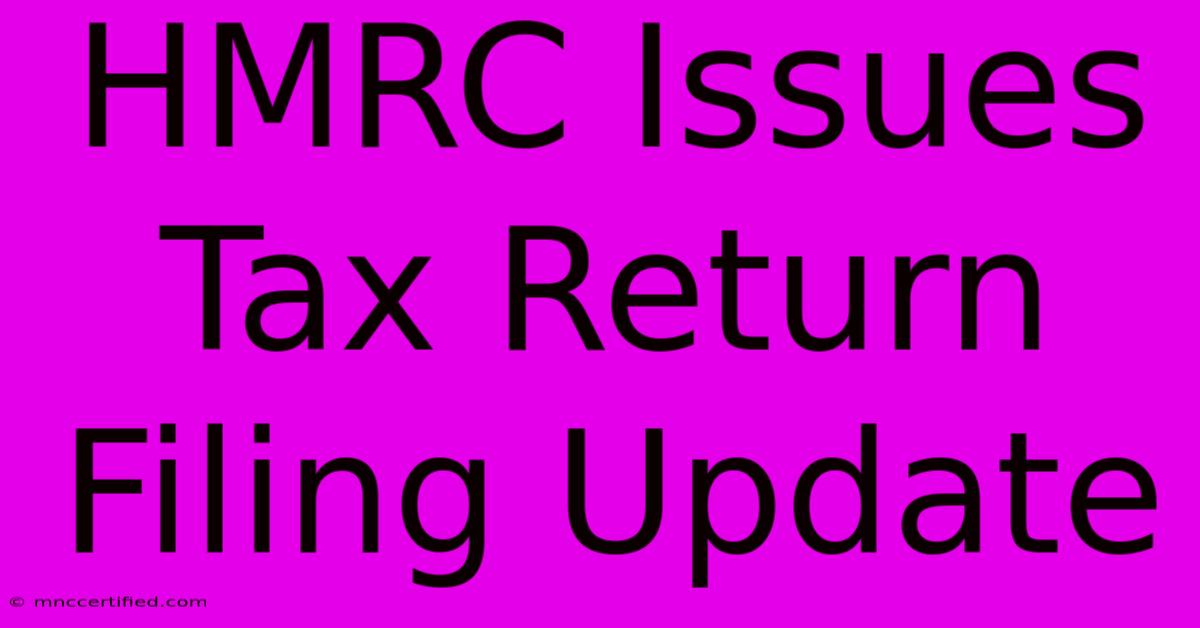HMRC Issues Tax Return Filing Update

Table of Contents
HMRC Issues Tax Return Filing Update: What You Need To Know
The UK's HM Revenue and Customs (HMRC) recently issued an update regarding tax return filing. This article breaks down the key changes and what they mean for you, whether you're a self-assessment taxpayer or a business owner. We'll cover important deadlines, potential penalties for late filing, and resources to help you navigate the process smoothly.
Key Updates from HMRC's Recent Announcement
HMRC's latest announcement may include several updates, depending on the specific time of release. These could include:
- Changes to Deadlines: HMRC sometimes adjusts filing deadlines for self-assessment tax returns, particularly around public holidays or system updates. Always check the official HMRC website for the most up-to-date information. Missing even a day can result in penalties.
- New Online Services: HMRC is continuously improving its online services. Recent updates might include enhancements to the online portal, making it easier to file your return, track your payments, and access your tax records. This could involve improvements to the user interface, accessibility features, or integration with other government services.
- Updates to Tax Rules and Regulations: The tax system is subject to change. HMRC announcements may detail new tax rules, allowances, or reliefs that affect your filing. Staying informed is crucial to ensure accurate and compliant returns.
- Penalties and Interest: HMRC might reiterate its penalties for late filing and late payment. Understanding these penalties is essential to avoid unnecessary financial repercussions.
- Information on Support and Resources: The update might highlight available support channels, such as helplines, online guides, and tax advisors, to assist taxpayers in completing their returns accurately and on time.
It's vital to stay informed about these changes. Failing to meet deadlines or comply with updated regulations can lead to significant penalties.
Understanding Your Tax Obligations
Regardless of the specific updates from HMRC, the core principles of tax return filing remain consistent. Here's a quick overview:
- Who Needs to File a Self-Assessment Tax Return? Generally, you'll need to file a self-assessment tax return if you're self-employed, a freelancer, a contractor, or receive untaxed income above a certain threshold.
- Gathering Your Information: Before you begin, gather all necessary documentation, including P60s, P11Ds, bank statements, and records of income and expenses. Accurate record-keeping is paramount.
- Using HMRC's Online Services: HMRC strongly encourages online filing. It's the most efficient and convenient method.
- Understanding Your Tax Liabilities: Accurately calculating your tax liability is crucial. If uncertain, seek professional advice.
Avoiding Penalties: Key Strategies
The most effective way to avoid penalties is to file your tax return on time and accurately. Here are some additional strategies:
- Set Reminders: Use calendar reminders or online tools to ensure you don't miss the deadline.
- Seek Professional Help: If you find tax filing complex, consider consulting a tax advisor or accountant. They can help you navigate the process and ensure accuracy.
- Keep Detailed Records: Maintain meticulous records of your income and expenses throughout the tax year. This will significantly simplify the filing process.
- Check Your Return Carefully: Before submitting, thoroughly review your return for errors or omissions.
Where to Find the Latest HMRC Information
The most reliable source for the latest HMRC updates is the official HMRC website. Regularly checking their news section and announcements is crucial for staying informed.
Conclusion: Proactive Tax Management is Key
Staying on top of HMRC updates is crucial for responsible tax management. By understanding your obligations, utilizing available resources, and proactively addressing potential issues, you can ensure a smooth and compliant tax filing experience. Remember, accuracy and timeliness are key to avoiding penalties and maintaining a positive relationship with HMRC.
Disclaimer: This article provides general information only and does not constitute professional tax advice. Always refer to the official HMRC website and/or consult a qualified tax professional for personalized guidance.

Thank you for visiting our website wich cover about HMRC Issues Tax Return Filing Update. We hope the information provided has been useful to you. Feel free to contact us if you have any questions or need further assistance. See you next time and dont miss to bookmark.
Featured Posts
-
Gomez Announces Engagement To Blanco
Dec 12, 2024
-
Juve Vs Man City Official Starting Lineups
Dec 12, 2024
-
Arsenal 3 0 Monaco Sakas Brace
Dec 12, 2024
-
Fifa Awards 2034 World Cup To Saudi Arabia
Dec 12, 2024
-
New Jersey Residents Report Drones
Dec 12, 2024